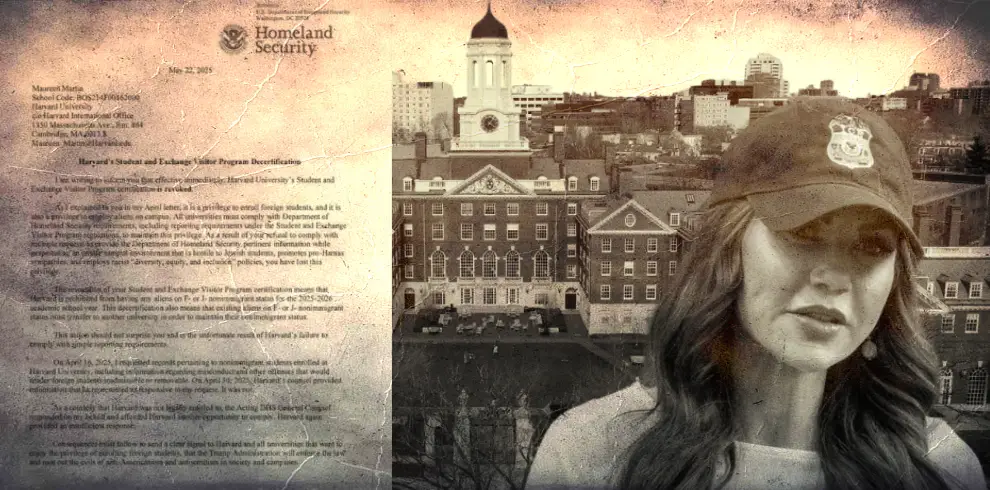It was a decision rendered in the tone of an autocracy, not in a democracy built on law and education. On May 22, 2025, the U.S. Department of Homeland Security immediately revoked Harvard University's participation in the Student and Exchange Visitor Program. The stroke of a bureaucratic pen did not just target one of the world’s most prestigious universities - it struck at its international soul.
Nearly 7,000 international students are affected. Among them: Princess Elisabeth of Belgium, 23 years old, future queen. She had just completed her first year in the Master of Public Policy program at the Harvard Kennedy School. Now, her academic future hangs in the balance. Xi Mingze, daughter of the Chinese President, is also studying in Cambridge - and is among those stripped of rights by Trump’s new doctrine.
"The consequences of this decision will only become clear in the coming days and weeks," the Belgian royal household stated. They are monitoring the situation with appropriate seriousness.
This is more than a bureaucratic measure. It is a symbolic declaration of war against an institution that refuses to politically submit.
Ideological Purge in the Name of Homeland Security
In the letter sent to the university on May 22, Secretary of Homeland Security Kristi Noem justified the move with grave accusations. Harvard, she claimed, maintains an “unsafe campus environment,” promotes “pro-Hamas sympathies,” employs foreign students while failing to cooperate with authorities, and upholds “racist diversity, equity and inclusion practices.” All of this, she stated, is incompatible with national security.
But the allegations remain vague - the consequences, by contrast, are unmistakably clear. Harvard may no longer admit new international students effective immediately, and existing F-1 and J-1 visas will expire at the end of the current academic year. Those who remain will lose their legal status - and potentially their future.
"With the stroke of a pen, the government seeks to erase a quarter of our student body," reads the lawsuit Harvard filed in federal court on Friday.
The Legal Response - and Its Limits
Harvard is fighting back - legally, forcefully, determinedly. In a 47-page complaint, the university accuses the Trump administration of breaking the law, violating due process, and trampling on the constitutionally guaranteed freedom of education. The action, it argues, is “a direct act of retaliation against Harvard’s refusal to submit to the executive’s ideological control.”
At the same time, a separate court ruling emerged that offers temporary relief. On Thursday, one day before Harvard’s lawsuit was filed, Federal Judge Jeffrey S. White issued an injunction from his courtroom in Oakland, California. He ruled that as long as a legal challenge against visa revocation is pending, the legal status of international students must not be altered. Arrests and deportations are prohibited - unless the individuals are guilty of serious violent crimes.
“These actions have not only disrupted the lives of the plaintiffs but of countless F-1 students across the United States - and continue to do so,” White wrote.
But one thing must be made clear - the protection of Harvard’s graduating international students does not stem from this ruling. It is based on the language in the Homeland Security letter itself. That letter explicitly states that the ban will not take effect until the 2025/2026 academic year. Those completing their studies now may graduate as planned. For all others, the wait begins - for clemency or for justice.
International Voices of Alarm
The outcry is global. Australia’s Ambassador Kevin Rudd described the move as a “violation of the promise of education” and offered consular support to affected students. In New Zealand, 18-year-old Jared - recently admitted to Harvard - now sits before a shattered vision of the future. “It was a moment of pride when I got my acceptance letter in March. Now it feels like the door is being slammed before I could even open it.”
Karl Molden, an Austrian junior at Harvard, described the mood as “toxic with fear and uncertainty.” In private chats, international students try to comfort each other - but the predominant feelings are fear over visas, financial aid, and recognition of their academic progress. “We’ve become pawns in this larger battle between democracy and authoritarianism,” Molden said.
Professors are sounding the alarm. Jason Furman, economist and former Obama advisor, called the move “horrendous on every level.” The international student body is not only an integral part of Harvard - it is a driver of research, innovation, and global dialogue. “Higher education is one of America’s greatest exports - and a key source of its soft power.”
The White House, meanwhile, accuses Harvard of turning “a once-great institution into a hotbed of anti-American, anti-Semitic, pro-terrorist agitation.” The administration appears more concerned with discipline than legality. Secretary Noem told Fox News that Harvard is a warning to all other universities - “If you don’t comply, you will face consequences.”
What Remains
What remains is a shaken faith in the American academic tradition. An institution like Harvard - founded in 1636, built on enlightenment and dissent - now finds itself in the crosshairs of a government that tolerates no opposition. The objective is clear - control over content, people, and ideas.
That it is precisely two young women - a princess from Europe and a president’s daughter from China - who now symbolically stand side by side under scrutiny is more than historical irony. Xi Mingze, daughter of Chinese President Xi Jinping and currently a master's student in international relations at the Kennedy School, is just as affected as Elisabeth of Belgium. It is proof that education knows no borders - except those imposed by politics.
“You are our classmates and friends, our colleagues and mentors,” wrote Harvard President Alan Garber to the student body. “Thanks to you, we know more and understand more deeply - and our society becomes wiser, stronger, more humane.”
These are words that must remain. And it is to be hoped that they are not the last that international students will hear from Harvard.
